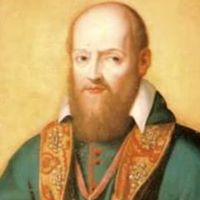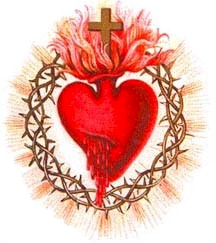Saint Francis de Sales: Doctor of Love
1626
My very dear Mother in Our Lord,
This letter is meant to let you know that there are others besides the domestic servants who honor and cherish the master of the house, that is to say, your venerable Father… You must then be a daughter and Religious with a great heart, as your holy Father once wrote to a very courtly lord: “The house of the Visitation has to be a house of daughters with great heart, in order to be daughters of a Father who had a heart that was greater and larger that the diameter of the earth.” Francis de Sales, whom I named, in the presence of your daughters yesterday, ‘the Prelate of divine love, the Bishop of charity‘. Blessed are the eyes which have seen the things that you have seen!
Father François Barroise, S.J. to Mother Paula-Jéronyme (L’Année Sainte, Vol. V, p.77)
Webster’s Third Unabridged Dictionary, 1935, defines “doctor” as teacher, with the etymology of the French verb, docere, “to teach” being noted. In 33 Doctors of the Church, its author Fr. Christopher Rengers, O.F.M. states, “There are three requisites for this highly distinguished title: holiness of life, importance and orthodoxy of writings, and official recognition by the Church.” In his brief declaring St. Francis a Doctor of the Church on November 16, 1877, Pope Pius IX connected his work as Doctor of Love to devotion to the Sacred Heart, stating: “It is in particular marvelous how, filled with the Spirit of God and drawing near to the Author of sweetness Himself, Saint Francis de Sales sowed the seeds of this Devotion to the Sacred Heart which, in these unhappy times, we have the great joy of seeing marvelously spread, to the great profit of religion.” Past-master of spiritual direction, Francis de Sales, Doctor of the Church, is a sure guide to devotion to the Sacred Heart of Jesus. Long before Jesus’ revelations to the Visitandine of Paray-le-Monial, Saint Margaret Mary, Francis de Sales lived and taught this devotion. In Margaret Williams’ book, The Sacred Heart in the life of the Church, she notes, “It was not sufficient for him to write a Treatise on the Love of God; Saint Francis clothed his own person in that sweet charity, so humorous, benign, and self-spending, with which he gave himself away to souls in need… He drew his charity from the Heart of the God-man, with whom he could so truly say, ‘Learn from me for I am meek and humble of heart.’ ” (p.95)
In Bishop Bougaud’s classic Life of Saint Margaret Mary Alacoque, Chapter VIII, he details point by point how the Sacred Heart was established to be the abode of the daughters of the Visitation. One paragraph serves as a summary: “Daughters of the Sacred Heart of Jesus! This is the name that St. Francis de Sales gave to his religious sixty years before the revelation made to Margaret Mary. He established them to be the ‘adorers of the Sacred Heart’; ‘the servants of the Sacred Heart’. The Heart of Jesus will be ‘their sojourn’; ‘to take from Jesus His Heart, and to open their breast to lodge Him therein, as in a sanctuary’ “. (p.48)
Because Jesus “formed his (Francis’) heart on the model of His own and rendered it the meekest and humblest of all hearts” (LSMMA, p.144), and because his careful pedagogy is developed “in spirit and truth”, we can trust this Doctor of Divine Love to teach us true devotion to His Sacred Heart.
Listening to the Heartbeat of the Infant Jesus
Deep within the womb of the virgin mother, the heartbeat of the unborn child Jesus is beating. We listen to its gentle rhythm as the holy couple continues their journey toward Bethlehem: “lub-dub-lub-dub” In the silence, the infant-God has his own thoughts: He recalls creation of the universe, the history of the chosen people, the destinies of nations. He foresees our own existence, our families’ destinies. He views each and every person and each of their lives: past, present, future. You. Me. “lub-dub-lub-dub” Mary and Joseph walk on. Bethlehem is on the horizon. The chosen people await their redeemer. He is come.
We, too, wait. This Child has plans for our future: for our welfare and not for our woe. Each pending circumstance of our life for this advent, for Christmas, for the coming year, is weighed in the wisdom of that silent womb. Do we trust this wisdom? Do we listen carefully in the star-studded night to the message of the almost imperceptible heartbeat? Our own Bethlehem is on the horizon: situations, some unresolved, some unforeseen, some joyful, some tragic – are all revealed to the secret gaze of his sleeping slumber in his mother’s womb. Our daily tasks and temptations and trials and triumphs – those, too, are the subject of his contemplation and the recipients of his graces. Will we respond? Are we childlike enough to entrust the great and minute decisions of the next moment of our life to the inspirations of his beating infant heart?
Advent. Waiting. Listening to a tiny heartbeat. Watching for a star. We await our redeemer. He is come.
St. Margaret Mary: Apostle of Devotion to the Sacred Heart of Jesus by Fr. Lewis Fiorelli, OSFS
V + J
St. Margaret Mary: Apostle of Devotion to the Sacred Heart of Jesus
October 16 is the Feast Day of St. Margaret Mary. The date this year is the beginning of a Holy Year in honor of the centenary of her canonization (May 13, 1920-May 13, 2020). The Holy Year begins on October 16, 2019 and ends on October 17, 2020.
The Church’s First Friday devotions, with a focus on reparation and reception of the Eucharist, and its yearly Feast in honor of the Sacred Heart find their origin in Jesus’s revelation of his Sacred Heart to this young Sister of the Visitation.
Pope Francis frequently speaks of the Christian life in the words of “encounter.” “Encounter” is a perfect description of what the young novice experienced. Jesus’s first words to her were words of a burning love for the whole human family and for her in particular. And he made it clear that his pierced Heart was the preeminent symbol of that burning love as well as the appropriate sign of his great desire that his love be known, experienced and reciprocated by all who, like her, would personally encounter that divine love in their devotion to his Sacred Heart.
The very first of her many visions took place on December 29 (1673), the Feast of St. John the Beloved Disciple who at the last supper rested his head on the heart of Jesus. Such an intimate moment between the disciple “whom Jesus loved” and Jesus himself is itself a powerful parable of love revealed, experienced and reciprocated. Margaret Mary herself was to have that same intimate experience, that same shared encounter of mutual love.
One cannot fully appreciate the meaning of the revelation of the Sacred Heart without knowledge of its historical context. The Church was at that time in the dark and forbidding grip of Jansenism, with its emphasis on the fear of God and eternal damnation.
With the revelation of his pierced Heart, along with his words and gestures of tender love, Jesus chose to place the emphasis on his forgiving, persuasive and inviting love, while also calling for reparation regarding abuses against the Eucharist: infrequent reception by Catholics (Jansenism), and rejection of the sacrament by Protestants.
Our Church finds itself in another crisis today. As a result, many believers have become discouraged, disillusioned and cynical.
The Holy Year of St. Margaret Mary and its renewed emphasis on devotion to the Sacred Heart comes in the midst of the horrible abuse crisis. Is it a mere coincidence or an act of divine Providence? For us in the Salesian family there are no coincidences, only Providence.
May God’s love show us the way back to the burning love of the Sacred Heart of Jesus and, in time, reconciliation with his guilty, wounded, but repentant and healing Church.


